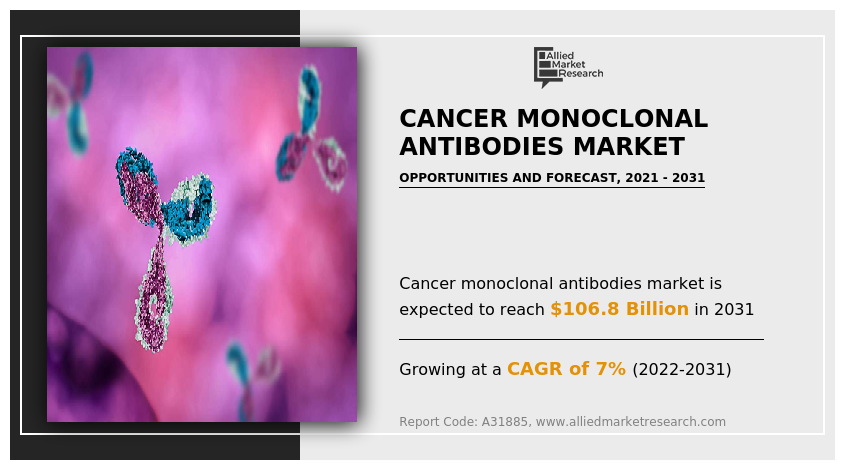
$106.8+ Billion Cancer Monoclonal Antibodies Market with a 7% CAGR Through 2031 | Explore 300+ Pages of Insights

Cancer Monoclonal Antibodies Market size, share, growth
PORTLAND, OREGON, UNITED STATES, April 23, 2024 /EINPresswire.com/ -- The robust growth of the cancer monoclonal antibodies market, valued at $55.6 billion in 2021 and projected to soar to $106.8 billion by 2031, highlights the increasing reliance on targeted therapies in oncology. Growing at a compound annual growth rate (CAGR) of 7% from 2022 to 2031, this sector represents a vital component of modern medical science, specifically in the treatment and management of cancer.
𝐆𝐞𝐭 𝐚 𝐒𝐚𝐦𝐩𝐥𝐞 𝐂𝐨𝐩𝐲 𝐨𝐟 𝐭𝐡𝐢𝐬 𝐑𝐞𝐩𝐨𝐫𝐭@https://www.alliedmarketresearch.com/request-sample/A31885
Monoclonal antibodies (mAbs) are engineered to mimic natural antibodies in the immune system, offering a high degree of specificity in targeting cancer cells. These antibodies bind to unique antigens present on the surface of tumor cells, effectively marking them for destruction by the body’s immune system or interrupting their growth and survival pathways.
The escalating prevalence of various cancers globally has spurred intense research and development efforts within the biopharmaceutical sector, leading to significant advances in mAb therapies. These efforts are not only enhancing the efficacy and safety of these therapies but are also expanding the range of cancers that can be targeted. The development of novel monoclonal antibodies is increasingly supported by sophisticated genetic engineering technologies, which allow for the creation of highly specific and potent mAbs.
Among the frontrunners in this field are major pharmaceutical giants such as F. Hoffmann-La Roche Ltd., Bristol Myers Squibb Co., and Merck & Co. These companies are at the forefront of innovation in the mAb sector, developing therapies that offer new hope to patients with previously intractable forms of cancer. For instance, Roche’s extensive portfolio of monoclonal antibodies has been pivotal in setting industry standards for treatment efficacy and safety.
North America continues to dominate the global market, largely due to its advanced biomedical ecosystem and robust healthcare infrastructure, which facilitate both the development and rapid adoption of new therapies. The region’s market leadership is further supported by collaborative efforts between biotech firms and pharmaceutical companies, aimed at accelerating the commercialization of breakthrough therapies. The collaboration between AbbVie and I-Mab is a testament to this, focusing on the development and marketing of novel therapeutic agents like Lemzoparlimab for the treatment of multiple malignancies.
The future trajectory of the cancer monoclonal antibodies market is likely to be shaped by several key factors:
Increased Investment in R&D: Continuous investment in research and development is crucial for discovering next-generation monoclonal antibodies that can target new antigens or overcome resistance mechanisms developed by cancer cells.
Technological Advancements: Innovations in biotechnology, such as gene editing and artificial intelligence, promise to enhance the design and production of mAbs, making them more effective and less costly to produce.
Regulatory Support: Favorable government policies and regulatory frameworks that expedite the approval process for new monoclonal antibodies will be vital in bringing these therapies to market quicker.
Global Health Dynamics: The rising global incidence of cancer necessitates widespread availability of effective therapies, potentially driving expansion into new markets, especially in developing regions where cancer rates are rising rapidly.
As we look towards a future where cancer treatments are increasingly personalized and targeted, the role of monoclonal antibodies is set to become ever more central. Their ability to offer tailored treatments based on the specific genetic profile of a tumor marks a shift towards more precise and effective cancer care, heralding a new era in oncology that promises better outcomes for patients worldwide.
𝐈𝐧𝐪𝐮𝐢𝐫𝐞 𝐁𝐞𝐟𝐨𝐫𝐞 𝐁𝐮𝐲𝐢𝐧𝐠: https://www.alliedmarketresearch.com/purchase-enquiry/A31885
#CancerMonoclonalAntibodies,#CancerTreatment,#OncologyInnovation,#MonoclonalAntibodies,#CancerResearch,#AntibodyTherapy,#CancerCare,#OncologyResearch,#Biotherapy,#CancerFighters,#CancerTherapy,#TargetedTherapy,#Immunotherapy,#CancerCure,#MedicalResearch,#CancerMedicine,#OncologyTherapeutics,#CancerTreatmentAdvances,#Biopharmaceuticals,#CancerPharma,#Biomedicine,#CancerSolutions,#ClinicalOncology,#CancerScience,#OncologyNurses,#CancerAwareness,#CancerSupport,#HealthcareInnovation,#CancerRecovery,#CancerSurvivor,#BiotechIndustry,#MedicalOncology,#CancerDrugs,#PrecisionMedicine,#CancerBiologics,#Pharmaceuticals,#CancerHealing,#CancerFree,#FightCancer
David Correa
Allied Market Research
+1 5038946022
email us here
Visit us on social media:
Facebook
Twitter
LinkedIn
EIN Presswire does not exercise editorial control over third-party content provided, uploaded, published, or distributed by users of EIN Presswire. We are a distributor, not a publisher, of 3rd party content. Such content may contain the views, opinions, statements, offers, and other material of the respective users, suppliers, participants, or authors.

